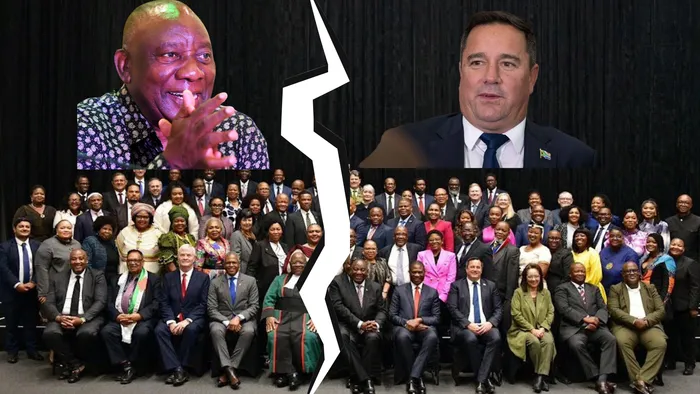Analysts warn DA-led no-confidence vote could topple Ramaphosa

President Cyril Ramaphosa’s future could hang by a balance if the Democratic Alliance (DA), party og GNU, continues with the motion of no-confidence against him.
Image: IOL Graphic
If the Democratic Alliance (DA) proceeds with a motion of no confidence against President Cyril Ramaphosa, it could mark the end of his presidency. That's according to political analysts.
Speaking with IOL News, Professor Bheki Mngomezulu said Ramaphosa previously survived parliamentary votes in the sixth administration because the African National Congress (ANC) held a majority in Parliament.
However, the party no longer have the May 2024 national elections.
“Anything is possible with the DA, because they don't seem to know what they are doing,” Mngomezulu said.
“Both the ANC and the DA are suffering from an identity crisis. The ANC behaves as though it is still the sole governing party, while the DA continues acting as the official opposition. But the reality is that they are now part of a coalition government and should be pulling in the same direction.”
He said the DA often second-guesses and “checkmates” the ANC, creating confusion about its intentions within the Government of National Unity (GNU).
Mngomezulu said two main reasons are preventing the DA from leaving the coalition - is the receipt of ministerial and deputy ministerial positions, and its desire to prevent the MK Party and the Economic Freedom Fighters (EFF) from joining the GNU.
His remarks come amid heightened tensions following Ramaphosa’s dismissal of Deputy Trade and Industry Minister Andrew Whitfield, a senior DA member, over an unauthorised international trip.
The blue party responded by withdrawing from the National Dialogue process, which is a key platform for inter-party consultation.
But, the party has not ruled out tabling a motion of no confidence against Ramaphosa.
“The DA can pack their things and leave, but on their way out, they will meet others coming in,” Mbalula said.
“Even if the DA walks away, the GNU will not collapse. Other parties are already knocking at the door to join. The GNU is powerful - it finishes you without you realising.”
Mbalula warned that any attempt to propose a motion of no confidence would result in the DA’s expulsion from the GNU.
He confirmed that the ANC’s National Working Committee (NWC) would meet Monday afternoon to discuss the matter.
Meanwhile, Mngomezulu said if the DA were to proceed with the motion, it would likely find support from smaller parties, including the MK Party, the EFF, and the African Transformation Movement (ATM).
“Even if ActionSA, which also has an identity crisis, were to vote against it, the rest could constitute the two-thirds majority needed, which would mean the end of Ramaphosa,” he said.
“But I don’t think it will come to that, because the ANC and DA do discuss issues behind closed doors.”
He called on the ANC to address the DA’s repeated challenges to its policies, including the Basic Education Laws Amendment (BELA) Bill, the Land Expropriation Bill, and its stances on foreign policy.
“They must also discuss the DA’s threats to oppose all budget speeches by ministers they disagree with, and the possibility of invoking Section 89 of the Constitution,” Mngomezulu said.
“They must assess what the DA’s exit would mean in terms of parliamentary numbers. That is critical.”
The ANC’s NWC is also expected to address the fate of Higher Education Minister Nobuhle Nkabane, who is facing criticism over the controversial appointment of the Services Sector Education and Training Authority (SETA) board.
In addition, Independent political analyst Goodenough Mashego echoed Mngomezulu’s remarks.
“If the DA were to bring a motion of no confidence against the president, it will definitely succeed,” Mashego said.
“It will succeed because it will have shifted the DA toward the MK and the EFF, because they need MK and EFF for the motion to succeed.”
However, he said the DA is unlikely to bring the motion unless it is certain it will pass.
“They wouldn’t want to embarrass themselves by bringing a motion that’s going to fail, thus spilling the end of their coalition with the ANC while they go out and they've got nothing to show for it,” he said.
Mashego said negotiating with the EFF and MK would be difficult, especially because it would require agreement on who would become president if Ramaphosa were removed.
“There is no scenario whereby the MK Party or EFF are going to allow the DA to appoint a president,” he said.
“If the DA also agrees with MK to appoint an MK president, there is no way an MK president will have the DA in Cabinet.”
Mashego expressed that the motion is unlikely to happen.
“They might talk about it as a bargaining tool, but they’re not going to do it,” he said.
“The recent DA stance is for optics. No South African is looking forward to the national dialogue, so withdrawing from it doesn’t change anything.”
He added that the DA is learning the limits of its influence in a coalition.
“They cannot push the ANC by using ultimatums…They have a deconfliction mechanism built into their agreement. For the DA to always want to use ultimatums doesn’t work well for their relationship.”
He said withdrawing from the National Dialogue was likely the strongest statement the DA could make without destabilising the GNU.
“They can’t withdraw from the GNU. They cannot call for a motion of no confidence. So they are learning gradually,” he said.
simon.majadibodu@iol.co.za
IOL Politics
Related Topics: